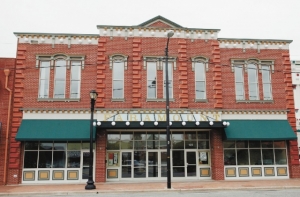City measures self-sufficiency
By Ty Johnson
Published in News on June 17, 2011 1:46 PM

News-Argus file photo
The Paramount Theatre is one of several areas city officials are looking at to see if the entities are supporting themselves through user fees.

News-Argus/MICHAEL K. DAKOTA
Questions have also been raised about the costs associated with the municipal golf course.
A strained budget has led the City Council to take a second look at the services it offers residents to see how close they are to paying for themselves.
The council recently has criticized the formula used to evaluate the self-sufficiency of city services that bring in revenue from user fees -- including water, trash pickup, the municipal golf course and the Paramount Theatre.
Finance Director Kaye Scott explained that the self-sufficiency indices show the percentage of operating costs that user-fee-driven revenue makes up, but two different criteria are used to show how efficient each service is. Depreciation and debt are factored into the percentages to give three different efficiency statistics.
"Anything you buy depreciates over time because it eventually needs to be replaced," Mrs. Scott said.
Debt payments for sewer and water bonds, golf course equipment and the Paramount Theatre reconstruction are factored in as well. Mrs. Scott said the best indicator of self-sufficiency lies in the percentage with depreciation and debt factored in.
Water and refuse registered 92.38 and 97.89 percent self-sufficiency ratings, respectively, while water reclamation came in at 78.19 percent, mostly due to the depreciation of its equipment. Without depreciation and with debt, the department's self-sufficiency score was 98.07 percent.
But those departments weren't the ones causing council members to raise eyebrows. The golf course and Paramount Theatre's self-sufficiency numbers with depreciation and debt accounted for were 60.87 percent and 12.84 percent, respectively, leading for the council to ask Sherry Archibald to look for ways to boost self-sufficiency.
As director of the Paramount Theatre and the interim director of the city's parks and recreation department, Mrs. Archibald is charged with identifying ways to increase the efficiency of both of the services that have come up in council discussions, although she says the numbers don't reflect the progress the Paramount has made in recent years.
Mrs. Scott provided percentages indicating the Paramount's self-sufficiency scores have increased each year since it reopened, from 10.05 to 11.32 to 12.18 percent in fiscal years 2008-09, 2009-10 and 2010-11, respectively. The theater reopened after extensive renovations following a 2005 fire in February 2008.
Mrs. Archibald said it is rare for municipality-run theaters to be self-sufficient, noting that theaters in Clayton and High Point have similar percentages when revenues were compared to expenses.
Plus, self-sufficiency was never the goal of the theatre, she said.
"When they talked, it was never said it would be a self-sufficient theatre," Mrs. Archibald said, adding that David Weil, who was instrumental in the Paramount's rebuilding, had told the council, flatly, that the theatre would not be a moneymaker directly. "But we're an economic engine. The Paramount brings in tourism dollars."
Mrs. Archibald said the theater's shows brought tourists and visitors to Goldsboro's downtown, bringing hotel customers in who contributed to the occupancy tax. Plus the theater's own performing arts series has been profitable, bringing in more than $6,000 more than it cost each of the past two years.
Mrs. Archibald said she is happy with the gradual progress the theater has made since its reconstruction and is fighting to not increase fees for rentals, especially since there were initial complaints from performance groups when new rates debuted along with the theatre's newly reconstructed look.
But the golf course is another story, she said, and Mayor Al King, an avid golfer, agreed.
"We're not satisfied with the numbers, but we're not going to close it," King said, saying the course is extremely important to the community. "We're going to work to reduce costs. Everything about it is on the table."
Still, King acknowledged that the course was an asset that, like the Paramount, will likely not break even.
"It's about quality of life," he said. "But we can't afford to let it continue to drain our revenues. (It) has to do more to stand on (its) own."
King said poor weather last year led to much of the decrease in golf course revenues, saying that's the risk with the course since no one wants to play in the rain or on soggy greens. Bringing in grass that doesn't require as much maintenance could lead to increased rounds per year, but that sort of expensive investment isn't a direction the city is in a position to take in the near future, he said.
Mrs. Archibald said, instead, the course is looking to cut costs and is considering raising fees. She noted that an increase of fees of just $1, when applied to the 20,000 rounds of golf played at the course annually, would help the course to become more self-sufficient.
The golf course isn't just about the facility itself, King said, but also about what it does for the community. He cited the recent announcement of Olive Garden's intent to open up in Goldsboro as evidence that attractions like the theater and the golf course were worth more than what their self-sufficiency percentages indicated.
"It helps to set the table when the city can provide something desirable," he said. "Businesses are going to go where they can make a profit, and they see that people want to come to Goldsboro."
